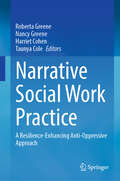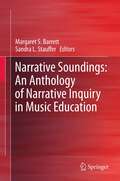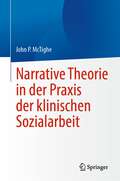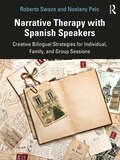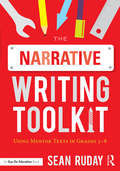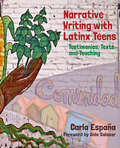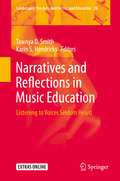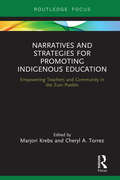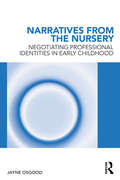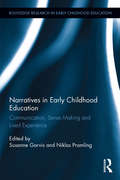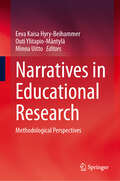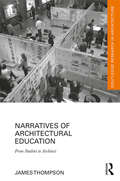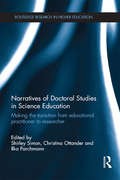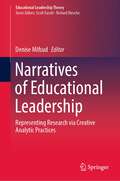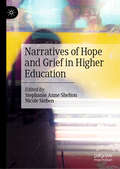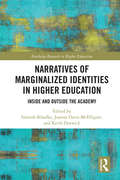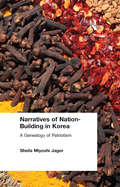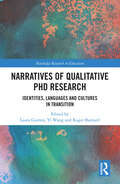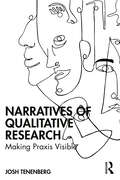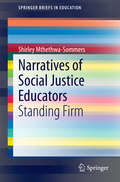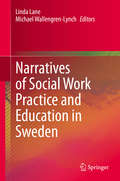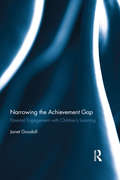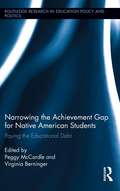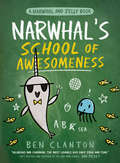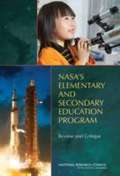- Table View
- List View
Narrative Social Work Practice: A Resilience-Enhancing Anti-Oppressive Approach
by Nancy Greene Roberta Greene Harriet Cohen Taunya ColeThis book highlights the co-creation of the narrative interview and explains how the narrative method can be used to promote competence and wellness, resist oppression, and ultimately liberate clients from their problems. The person-in-environment concept brings together a wide range of personal and societal micro to macro influences that allow practitioners to engage in an effective helping process with diverse individuals, families, groups, organizations, and communities. The textbook has been written at a time of pronounced sociocultural and historical flux, uncertainty, and civil strife that threaten to disrupt the social fabric of the United States. Consequently, the book augments the resilience-enhancing stress model (RESM) approach to the narrative methodology. Each chapter of the text describes a client or constituency undergoing a life transition and the associated risks (stressors) and protective factors surrounding them. Among the topics covered are: Adopting RESM Anti-Oppressive Social Work Strategies: A Micro to Macro Approach Co-creating a Narrative: Forming Personal Identity Macrolevel Narrative Skills and Techniques Proactive Resilience Social Work Practice Time, Place, and Resilience The ultimate purpose of the book is for social workers to develop the ability to enhance clients' and constituencies' optimal resilient social functioning in a just and equitable world that embraces diversity, equity, and inclusion. Although narrative social work practice is not yet widely applied, the text elucidates how storytelling can break new ground in achieving asset-based, resilience-enhancing social work practice as well as redress social, economic, and political injustice. Narrative Social Work Practice: A Resilience-Enhancing Anti-Oppressive Approach is the third in a series of texts that defines risk and resilience theory and its offshoot—the RESM. The book is intended primarily for generalists and advanced students as well as practitioners in the social work field.
Narrative Soundings: An Anthology of Narrative Inquiry in Music Education
by Sandra L. Stauffer Margaret S. BarrettThis volume focuses specifically on narrative inquiry as a means to interrogate research questions in music education, offering music education researchers indispensible information on the use of qualitative research methods, particularly narrative, as appropriate and acceptable means of conducting and reporting research. This anthology of narrative research work in the fields of music and education builds on and supports the work presented in the editors' first volume in Narrative Inquiry in Music Education: Troubling Certainty (Barrett & Stauffer, 2009, Springer). The first volume provides a context for undertaking narrative inquiry in music education, as well as exemplars of narrative inquiry in music education and commentary from key international voices in the fields of narrative inquiry and music education respectively.
Narrative Theorie in der Praxis der klinischen Sozialarbeit
by John P. McTigheDieser Theorie-Praxis-Leitfaden bietet Psychiatrie-Erfahrenen einen leistungsstarken erzählbasierten Ansatz für die Arbeit mit Klienten in der klinischen Praxis. Es beginnt mit einer Einführung in die zeitgenössische Erzähltheorie und bietet einen soliden Rahmen, der auf der Kunst und den Techniken des Zuhörens basiert, um ein tieferes und sinnvolleres Verständnis und Eingreifen zu ermöglichen.Die Kapitel vertiefen diese grundlegenden Konzepte, indem sie sie auf eine Vielzahl von Bevölkerungsgruppen und Themen anwenden, darunter Rasse und ethnische Zugehörigkeit, menschliche Sexualität, Immigration und die Erfahrung von Trauma, Trauer und Verlust. Die einnehmende Stimme des Autors, der durchdachte pädagogische Stil und der umfangreiche Einsatz von Beispielen und Übungen tragen dazu bei, dass der Leser seine eigene Geschichte von Wachstum und Selbsterkenntnis erzählt.Zu den Themen gehören:- Begegnung mit dem Selbst, Begegnung mit dem Anderen: Erzählungen über Rasse und Ethnizität.- Gemeinsam überleben: individuelle und gemeinschaftliche Erzählungen nach einer Tragödie.- Spirituelle Geschichten: Erkundung der letzten Bedeutung in der Praxis der Sozialarbeit.- Sexuelle Geschichten: Erzählungen über sexuelle Identität, Geschlecht und sexuelle Entwicklung.- Die Heimat verlassen, die Heimat finden: narrative Praxis mit Migrantengruppen.- Weitergehen: Narrative Perspektiven auf Trauer und Verlust. Narrative Theorie in der Praxis der klinischen Sozialarbeit richtet sich sowohl an Studierende als auch an erfahrene Sozialarbeiterinnen und Sozialarbeiter sowie an Fachleute und Praktikerinnen und Praktiker in verwandten klinischen Bereichen, die daran interessiert sind, ihre Arbeit mit einem narrativen Ansatz zu untermauern.
Narrative Therapy with Spanish Speakers: Creative Bilingual Strategies for Individual, Family, and Group Sessions
by Roberto Swazo Noelany PelcNarrative Therapy with Spanish Speakers provides counselors, social workers, and other mental health professionals with a variety of culturally responsive bilingual activities developed for use with clients of all ages. Each short chapter covers topics such as fear, acceptance, and trust; the chapters also employ short fictions, sayings, and quotes, all in both Spanish and English, that professionals can share directly with clients. Additional materials on the book’s website include audio resources for both counselors and clients, and the book is replete with icons and guides to help counselors quickly find relevant material.
The Narrative Writing Toolkit: Using Mentor Texts in Grades 3-8
by Sean RudayIn order for students to write effective narratives, they need to read good narratives. In this practical book, you’ll find out how to use mentor texts to make narrative writing instruction more meaningful, authentic, and successful. Author Sean Ruday demonstrates how you can teach elementary and middle school students to analyze the qualities of effective narratives and then help them think of those qualities as tools to improve their own writing. You’ll learn how to: Introduce your students to the key features of a successful narrative, such as engaging the reader, organizing an event sequence, and crafting a strong conclusion. Assess students’ writing by evaluating the specific attributes of an effective narrative. Make narrative writing an interactive, student-driven exercise in which students pursue their own writing projects. Use mentor texts to help students learn the core concepts of narrative writing and apply those skills across the curriculum. Encourage students to incorporate technology and multimedia as they craft their narratives. The book is filled with examples and templates you can bring back to the classroom immediately, as well as an annotated bibliography with mentor text suggestions and links to the Common Core. You’ll also find a study guide that will help you use this book for professional development with colleagues.Bonus: Blank templates of the handouts are available as printable eResources on our website (http://www.routledge.com/9781138924390).
Narrative Writing with Latinx Teens: Testimonios, Texts, and Teaching
by Carla EspañaHow can we create writing instruction that allows Latine youth to desahogarse, where writing is a release? How can we learn more about Latinx youth and the issues that matter to them so that we can all reimagine a better world?In Narrative Writing with Latinx Teens: Testimonios, Texts, and Teaching, Dr. Carla España introduces the Writing for Desahogo Teaching Framework, a foundation for twenty writing lessons that immerse students in texts on topics that include (im)migration, mental health, language, resilience, and community to facilitate their discussions and writing.Inspired by research with Latinx teens and young adults, Dr. España bookends each chapter with the words of Latinx youth and testimonios by Latinx educators while inviting teachers to share in the vulnerability of writing to heal with her own creative writing expanding on these topics. Poems and narratives give readers a lens into Dr. España’s particular experience while setting up teacher and student text sets as entry points into the topic of study. Each chapter’s lesson sequences include four text types for study:● Multimedia introduction● Poetry immersion● Middle-grade literature● Young adult literatureNarrative Writing with Latinx Teens is a weaving of Dr. España’s teaching in different settings with Latinx teens in middle grade classrooms and presently, in the Department of Puerto Rican and Latinx Studies at Brooklyn College. It’s reimagined writing workshops meets Ethnic Studies.Ultimately, this book invites educators to consider the complexity of the Latinx diaspora, dispel myths of Latinidad, and consider the ways we can create spaces for the writers in our midst to feel like they can flourish in their criticality and in their joy.With a foreword by award-winning author, arts activist, and translator, Aida Salazar, Narrative Writing with Latinx Teens calls us to grow in our courage, curiosity, and criticality, following the examples of the youth and creators of Latin American descent it features and celebrates.
Narratives and Reflections in Music Education: Listening to Voices Seldom Heard (Landscapes: the Arts, Aesthetics, and Education #28)
by Tawnya D. Smith Karin S. HendricksThis volume offers chapters written by some of the most respected narrative and qualitative inquiry writers in the field of music education. The authorship and scope are international, and the chapters advance the philosophical, theoretical, and methodological bases of narrative inquiry in music education and the arts. The book contains two sections, each with a specific aim. The first is to continue and expand upon dialogue regarding narrative inquiry in music education, emphasizing how narrative involves the art of listening to and hearing others whose voices are often unheard. The chapters invite music teachers and scholars to experience and confront music education stories from multiple perspectives and worldviews, inviting an international readership to engage in critical dialogue with and about marginalized voices in music. The second section focuses on ways in which narrative might be represented beyond the printed page, such as with music, film, photography, and performative pieces. This section includes philosophical discussions about arts-based and aesthetic inquiry, as well as examples of such work.
Narratives and Strategies for Promoting Indigenous Education: Empowering Teachers and Community in the Zuni Pueblo
by Marjori Krebs Cheryl A. TorrezThis book describes the experiences of students, educators, and community members living in the Zuni Pueblo and working to integrate Indigenous language, culture, and history in in the Zuni Pueblo schools. Aimed at teacher education faculty seeking to work in collaborative relationships with Indigenous populations, this volume offers a first-hand account of the challenges and opportunities surrounding the preservation of Indigenous culture in pre-K-12 curriculum and instruction. Featuring a range of perspectives from within a tribal educational institution, this book demonstrates the possibilities for successful partnerships between Indigenous schools and Western systems of education.
Narratives from the Nursery: Negotiating professional identities in early childhood
by Jayne OsgoodThis accessible and timely book builds upon and contributes to ongoing debates surrounding professionalism in the early years workforce. In a sector where policy is rapidly changing, Jayne Osgood challenges existing assumptions concerning professional identities and questions what broader lessons might be learnt about race, ethnicity, social class
Narratives in Early Childhood Education: Communication, Sense Making and Lived Experience (Routledge Research in Early Childhood Education)
by Susanne Garvis Niklas PramlingOver the past few decades, a growing body of literature has developed which examines children’s perspectives of their own lives, viewing them as social actors and experts in their understanding of the world. Focusing specifically on narratives, this unique and timely book provides an analysis of these new directions in contemporary research approaches to explore the lived experiences of children and teachers in early childhood education, in addition to presenting original research on children’s narratives. The book brings together a variety of well-regarded international researchers in the field to highlight the importance of narrative in young children’s development from local and global perspectives. While narrative is clearly understood within different countries, this is one of the first texts to build an international understanding, acknowledging the importance of culture and context. It presents up-to-date research on the latest research methods and analysis techniques, using a variety of different approaches in order to critically reflect on the future for narrative research and its insights into early childhood education Narratives in Early Childhood Education will be of interest to postgraduate students, academics and researchers in early childhood education, as well as early childhood professionals, government policy makers and early childhood organisations and associations.
Narratives in Educational Research: Methodological Perspectives
by Outi Ylitapio-Mäntylä Eeva Kaisa Hyry-Beihammer Minna UittoThis edited volume focuses on narratives and diverse narrative approaches in the field of education. It discusses the concept of narrative and its boundaries as well as illustrates in detail the many ways of producing and analyzing diverse narrative research materials. Its chapters provide rich examples of oral, written, and visual narratives produced in peer interviews and group discussions as well as via creative writing and photographs. Various narrative ways of analyses are applied. The book reflects on research ethics, the position of the researcher and collaboration between participants and researchers as well as between researchers, also cross-culturally. By exploring and illustrating innovative ways to conduct research on and with narratives in the educational field, the book is a great resource for researchers and students in the field of education, social sciences and humanities.
Narratives of Architectural Education: From Student to Architect (Routledge Research in Architecture)
by James ThompsonNarratives of Architectural Education provides an overview of life as an architecture student, detailing how a layperson may develop an architectural identity. This book proposes becoming an architect as a personal narrative of professional development structured around various stages and challenges associated with identity transformation. Using a case study of aspiring architects along multiple time points of their professional education, Thompson investigates the occupational identity of architects; how individuals construct a sense of themselves as future architects and position themselves within the architectural community. This book provides previously unexamined insights into not just the academic development of an architect, but also the holistic and experiential aspects of architectural education. It would be ideal for those in the educational field of architecture, to include students, educators, interns, and mentors.
Narratives of Doctoral Studies in Science Education: Making the transition from educational practitioner to researcher (Routledge Research in Higher Education)
by Shirley Simon Ilka Parchmann Christina OttanderThis book explores the ways in which small scale research studies arise from issues of practice, and how they are conceptualised, theorised and implemented using a variety of methodological approaches and frameworks. The narratives written by thirteen doctoral students tell real stories of projects and challenges that researchers face when making the transition from educational practitioner to researcher. Considering case studies from the UK, Sweden and Germany, chapters seek to investigate and inform others about how doctoral students solved individual and typical problems linking practice and research. Each methodological journey highlights and illustrates the iterative and cyclic nature of research, and the normality of the process of going back and forth between data and theory, making changes of direction as research proceeds. The book includes frameworks for combining research, theory and practice, drawing from the methodological decisions and conclusions each contributor made to develop their own practice oriented research. Narratives of Doctoral Studies in Science Education will be key reading for researchers and academics in the fields of educational research, science education, research methods and higher education, as well as masters and doctoral students undertaking their own research projects.
Narratives of Educational Leadership: Representing Research via Creative Analytic Practices (Educational Leadership Theory)
by Denise MifsudThis book documents and deconstructs the concept of educational leadership within various education settings originating from diverse global environments. It focuses on presenting different readings of educational leadership via distinct theoretical and methodological applications. It takes forward the idea of critical leadership studies and uses creative analytic practices to present layered readings of educational leadership.The book offers leadership studies dealing with various education settings across a wide spectrum with international perspectives. It provides examples of educational narratives through somewhat unconventional modes of representation. This book is beneficial to readers interested in the study of educational leadership and using qualitative methodologies in educational research.
Narratives of Hope and Grief in Higher Education
by Stephanie Anne Shelton Nicole SiebenThis collection weaves together the personal narratives of a group of diverse scholars in academia in order to reflect on the ways that grief and hope matter for those situated within higher education. Each chapter explores a unique aspect of grief and loss, from experiencing a personal tragedy such as the loss of a loved one, to national and international grief such as campus shootings and refugee camp experiences, to experiencing racism and microaggressions as a woman of color in academia, to the implications of religious differences severing personal ties as an individual navigates research and academic studies. Unlike most resources examining grief, this collection pushes beyond notions of sorrow as solely individual, and instead situates moments of loss and hurt as ones that matter politically, academically, professionally, and personally. The editors and their authors offer pathways forward to academics, researchers, teachers, pedagogues, and thinkers who grapple with grief in a variety of forms, transforming this book into a critical resource of hope to those in the field of education (and others) who may feel the effects of an otherwise solitary journey of grief, to create an awareness of solidarity and support that some may not realize exists within academic circles.
Narratives of Marginalized Identities in Higher Education: Inside and Outside the Academy (Routledge Research in Higher Education)
by Santosh Khadka Joanna Davis-McElligatt Keith DorwickThis book features theorized narratives from academics who inhabit marginalized identity positions, including, among others, academics with non-normative genders, sexualities, and relationships; nontenured faculty; racial and ethnic minorities; scholars with HIV, depression and anxiety, and other disabilities; immigrants and international students; and poor and working-class faculty and students. The chapters in this volume explore the ways in which marginalized identities fundamentally shape and impact the academic experience; thus, the contributors in this collection demonstrate how academic outsiderism works both within the confines of their college or university systems, and a broader matrix of community, state, and international relations. With an emphasis on the inherent intersectionality of identity positions, this book addresses the broad matrix of ways academics navigate their particular locations as marginalized subjects.
Narratives of Nation-Building in Korea: A Genealogy of Patriotism
by Sheila Miyoshi JagerThis book offers new insight on how key historical texts and events in Korea's history have contributed to the formation of the nation's collective consciousness. The work is woven around the unifying premise that particular narrative texts/events that extend back to the premodern period have remained important, albeit transformed, over the modern period and into the contemporary period. The author explores the relationship between gender and nationalism by showing how key narrative topics, such as tales of virtuous womanhood, have been employed, transformed, and re-deployed to make sense of particular national events. Connecting these narratives and historic events to contemporary Korean society, Jager reveals how these "sites" - or reference points - were also successfully re-deployed in the context of the division of Korea and the construction of Korea's modern consciousness.
Narratives of Qualitative PhD Research: Identities, Languages and Cultures in Transition (Routledge Research in Education)
by Laura Gurney Yi Wang Roger BarnardThe book provides a grounded, narrative exploration of contemporary qualitative PhD research in the fields of language education and applied linguistics. The chapters are authored by current and former PhD candidates studying in New Zealand, with commentaries from international experts in the field. The book contains ten chapters in addition to the foreword, introduction and afterword. Each chapter addresses a different stage of PhD candidature: pre-enrolment; the first six months, research design, literature review, data collection, data analysis, drafting chapters, supervision and feedback, publishing and the examination process. Each chapter includes a set of questions for the readers to reflect on issues raised by the authors, and a comprehensive list of references. The book is intended for an audience of prospective and current PhD candidates, PhD supervisors, academic language and learning advisors who work with PhD candidates, researchers working in the field of doctoral education, and university administrators in pertinent leadership roles.
Narratives of Qualitative Research: Making Praxis Visible
by Josh TenenbergNarratives of Qualitative Research uses a novel form of writing about how to do qualitative research called a praxis narrative. Each narrative is told from the author’s perspective in carrying out one of his past research studies in the social sciences.Told chronologically and in a first-person voice, the narratives position the reader alongside the narrator so as to vicariously experience how research happens in its situated particulars. Rather than a set of idealizations and universalized pronouncements, the author reveals what really goes on when one is in the thick of complex and challenging research studies, the points of trouble along with the successes. This will be relevant to researchers who have already undertaken one or more empirical research studies (though not necessarily using qualitative approaches) and now find themselves facing something new: a new analytic method, a new theoretical lens, a new form of data collection, a new domain of research questions, a new rhetorical approach. This requires letting go of the secure handholds of prescribed methods and responding to the contingencies that arise in the midst of the research. The reader is invited to follow along as the author makes visible his praxis of qualitative research.Unlike more conventional texts, in this unique alternative, the reader can follow the author's journey through his research studies as a way to reorient their conception of qualitative research and their own praxis of it. This is fascinating reading for qualitative researchers and students taking qualitative research courses, across the social sciences, education, and behavioural sciences.
Narratives of Social Justice Educators
by Shirley Mthethwa-SommersThis book presents narratives of eminent social justice educators, which provide a window into why these educators have made it their mission to educate for attainment of social justice; it succinctly defines what social justice education is and what it is not. Eleven nationally and internationally eminent narratives of social justice educators, namely, Beverly Daniel Tatum, Sonia Nieto, Kevin Kumashiro, Valerie Ooka Pang, Teresita Aguilar, Gaille Canella, Christine Sleeter, Julie Andrzejewski, Norma Bailey, Kent Koppelman, and Cathy Pohan, are featured. Racial, gender, socio-economic class, and sexuality diversity of the social justice educators enriches the book by providing multidimensional perspectives on the impact of social positioning in choosing to educate for social justice. Chapter One, "Introduction to Social Justice Educators," provides an in-depth introduction to the social justice educators who are featured in the book. It delineates reasons they were selected to participate in the study of narratives for social justice educators. This chapter highlights diverse paths that contributed to the participants engaging in social justice education and outlines all their contributions to social justice education. Chapter Two, "Personal Influence," describes the participants' personal influences and how formative years of interacting with family members and peers contributed in shaping their identities as social justice educators. In addition, this chapter examines how their varied racial, gender, and sexuality identities served to prepare them for their profession. Chapter Three, "Professional Influence," offers a window into the participants' professional life influences on their choice to work toward social justice education. The educators discuss the impact of individual teachers and professors, the field in which they work and exposure to specific curriculum and readings that served to ignite their interest in educating for social justice. Chapter Four, " Impact of Social and Historical Events," explores the influence of social and historical events had in the evolution of social justice educators. Such events compelled social justice educators to critically reflect on their roles in society and the importance of engaging in social justice activism through their work. Chapter Five, " Reasons for Standing Firm," focuses on reasons that keep social justice educators holding firm to their convictions of social justice education and teaching for social change. It explores the role of spirituality and their sense of commitment. Chapter Six , "Epilogue," offers a synthesis of the experiences of social justice educators, implications for teacher education programs, and lessons that can be gleaned from their narratives. Stories from the social justice educators provide theoretical and pedagogical frameworks for teaching about social justice issues in education. Each chapter concludes with lessons that can be gleaned from the narratives and applied when working with students.
Narratives of Social Work Practice and Education in Sweden
by Linda Lane Michael Wallengren-LynchThis book brings a novel approach to issues of connecting social work practice to theory and the personal life narrative. The authors each find their own unique way of integrating the self, theory, and practice, in different social work practice and education settings. Contributors use the methodology of narrative to tell their story about their social work journey, be that in research, teaching, or practice. The backdrop for this book is Sweden. The country’s rich heritage of welfare provision but also recent cultural diversity offers a unique Nordic context to the subject matter. The contributors engage with these new conditions for Swedish social work through an intersectional lens. Topics explored include: Digging in the present: A day in the life of a school counsellorWe live in a political world: Between needs and moneyThe problematic labour market situation of immigrants to Sweden: Consequences and causesTackling the contradictory nature of social workUsing anti-oppressive practice to promote social inclusion in social work education The result is a book that is personal and reflexive, and positions the contributors' narratives as a window to understand and address social problems.Narratives of Social Work Practice and Education in Sweden should engage those interested in the Swedish welfare state, and who want to learn about how social work is taught and practised in this country. Intended to be a general introduction, the book provides guidance to those considering working in the field and for those newly qualified. It also provides examples for students of social work to connect personal narratives to social work settings.
Narrowing the Achievement Gap: Parental Engagement with Children’s Learning (Routledge Research in Education)
by Janet GoodallNarrowing the Achievement Gap proposes a radical change to our conception of learning, education and schooling, arguing that parental engagement is the best lever we have for school improvement and closing the achievement gap. Unique in its focus on original research linking underachievement and parental engagement, this book uses a range of international case studies to demonstrate that achievement isn’t only reliant on what happens in school and that what happens out of school is equally important. Each chapter explores how schools can actively engage with parents and communities to reinstate education in the home, and to generate support to combat issues out of their control, including poverty, deprivation, and a lack of social capital. Although schools have an integral part to play in this process, it argues that parents and society must reconsider their own educational responsibility, regardless of background, and offers a solid research base and practical suggestions to help do so. Consisting of an in-depth and contemporary study of this significant issue in educational achievement and written by an expert in the field, this text will appeal to researchers, academics and postgraduate students in the fields of education, schooling, sociology of education, school effectiveness and improvement, school policy and school leadership.
Narrowing the Achievement Gap for Native American Students: Paying the Educational Debt (Routledge Research in Education Policy and Politics #6)
by Peggy McCardle Virginia BerningerThere has been much talk and effort focused on the educational achievement gap between white versus black, Hispanic and American Indian students. While there has been some movement the gap has not appreciably narrowed, and it has narrowed the least for Native American students. This volume addresses this disparity by melding evidence-based instruction with culturally sensitive materials and approaches, outlining how we as educators and scientists can pay the educational debt we owe our children. In the tradition of the Native American authors who also contribute to it, this volume will be a series of "stories" that will reveal how the authors have built upon research evidence and linked it with their knowledge of history and culture to develop curricula, materials and methods for instruction of not only Native American students, but of all students. It provides a framework for educators to promote cultural awareness and honor the cultures and traditions that too few people know about. After each major section of the volume, the editors will provide commentary that will give an overview of these chapters and how they model approaches and activities that can be applied to other minority populations, including Blacks, Hispanics, and minority and indigenous groups in nations around the globe.
Narwhal's School of Awesomeness (A Narwhal and Jelly Book #6)
by Ben ClantonINTERNATIONAL BESTSELLER Narwhal and Jelly become the coolest teachers in the world wide waters in the hilarious sixth book of this blockbuster graphic novel series!Dive into four new stories about Narwhal and Jelly becoming substitute teachers! The two best friends come across an enthusiastic school of fish one morning. Unfortunately, Mr. Blowfish, their teacher, has come down with a cold, and class will have to be cancelled . . . until Professor Knowell (Narwhal) and Super Teacher (Jelly) volunteer to help out! The first subject is Wafflematics, in which Narwhal and Jelly calculate the number of waffles needed to feed the class. That's what we're chalking about! Next up is a super-fun science scavenger hunt, followed by a game of "Tag! You're Awesome!" at recess. Narwhal's teaching methods may be unconventional, but with Jelly's help, the two teach (and learn) with their trademark positivity and humor. Before they know it, the day is over . . . but what grade will Narwhal receive from Jelly?
NASA'S ELEMENTARY AND SECONDARY EDUCATION PROGRAM: Review and Critique
by National Research Council of the National AcademiesThe National Academies Press (NAP)--publisher for the National Academies--publishes more than 200 books a year offering the most authoritative views, definitive information, and groundbreaking recommendations on a wide range of topics in science, engineering, and health. Our books are unique in that they are authored by the nation's leading experts in every scientific field.
